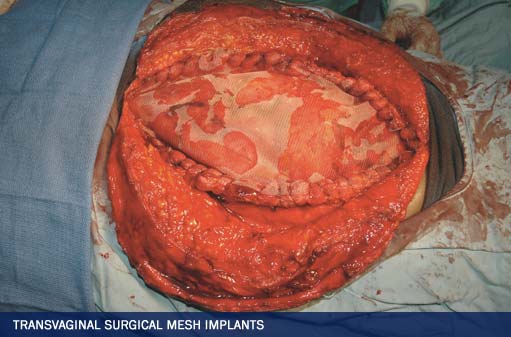
Get Help With Your Transvaginal Mesh Claim Millions of women have received a transvaginal mesh implant or mesh sling to help repair pelvic organ prolapse (POP) or stress urinary incontinence (SUI). POP occurs when the organs in the pelvis slide out of place, and SUI is the involuntary release of urine during activities such as sneezing or […]
 Millions of women have received a transvaginal mesh implant or mesh sling to help repair pelvic organ prolapse (POP) or stress urinary incontinence (SUI). POP occurs when the organs in the pelvis slide out of place, and SUI is the involuntary release of urine during activities such as sneezing or coughing. These conditions can severely impact quality of life.
Millions of women have received a transvaginal mesh implant or mesh sling to help repair pelvic organ prolapse (POP) or stress urinary incontinence (SUI). POP occurs when the organs in the pelvis slide out of place, and SUI is the involuntary release of urine during activities such as sneezing or coughing. These conditions can severely impact quality of life.
These devices, however, have been linked to a high rate of serious complications. The personal injury attorneys at Parker Waichman LLP are investigating injuries associated with transvaginal or pelvic mesh devices, and we offer free case evaluations to those who have been harmed by these implants. Contact us today to speak with a top transvaginal mesh lawyer about your legal rights.
Transvaginal mesh is a mesh implant meant to help correct POP and SUI by providing the pelvic organs and muscles with extra support.
The U.S. Food and Drug Administration has found that the most common side effects and complications associated with transvaginal mesh include:
In 2016, the FDA reclassified transvaginal mesh as a Class III high-risk medical device, and in April 2019, the FDA ordered a halt to the sale of these devices. Now, thousands of women are suing their manufacturers. A qualified transvaginal mesh attorney can help you get the compensation you deserve for the harm caused by these dangerous medical devices.
Pelvic mesh lawsuits have been filed on behalf of women around the country against several manufacturers of transvaginal mesh (TVM) and sling devices, including:
Victims of vaginal mesh implant and sling failures, who choose an experienced lawyer for their transvaginal mesh lawsuit, may be compensated for injuries and losses including:
Numerous lawsuits have been filed against the makers of these dangerous medical devices, with thousands of cases still pending. More than 100,000 cases have been consolidated into multi-district litigation against their manufacturers, and millions of dollars in compensation have been awarded so far through either a transvaginal mesh settlement or jury verdict.
| Company | MDL # |
| American Medical Systems | 2325 |
| Boston Scientific | 2326 |
| Coloplast | 2387 |
| C.R. Bard | 2187 |
| Ethicon (Johnson & Johnson) | 2327 |
| Mentor (Johnson & Johnson) | 2004 |
Transvaginal mesh litigation is ongoing, with plaintiffs accusing companies of design and manufacturing defects, failure to warn, breach of warranty, fraud, violations of state consumer protection laws, and loss of consortium. Women are also seeking compensation for injuries including severe chronic pain, infections, mesh migration and erosion, and nerve damage.
If you or someone you know suffered painful injuries after being implanted with a transvaginal mesh device, you may be able to pursue compensation. When you work with an experienced attorney at Parker Waichman, we’ll evaluate your case for free, and you’ll pay nothing out of pocket for our services: we only get paid from a portion of your settlement or jury verdict. Our lawyers will fight tirelessly for your legal rights as they compile evidence for your transvaginal mesh lawsuit, update you on the discovery process, advise you on any potential settlement offer, and advocate for you in court. At Parker Waichman, we’re here for you every step of the way to answer your questions, starting with your initial consultation.
When you need a top lawyer for a transvaginal mesh lawsuit, our attorneys are only a phone call away. Call 1-800-YOUR-LAWYER (1-800-968-7529) or fill out our online form today for a free consultation.


